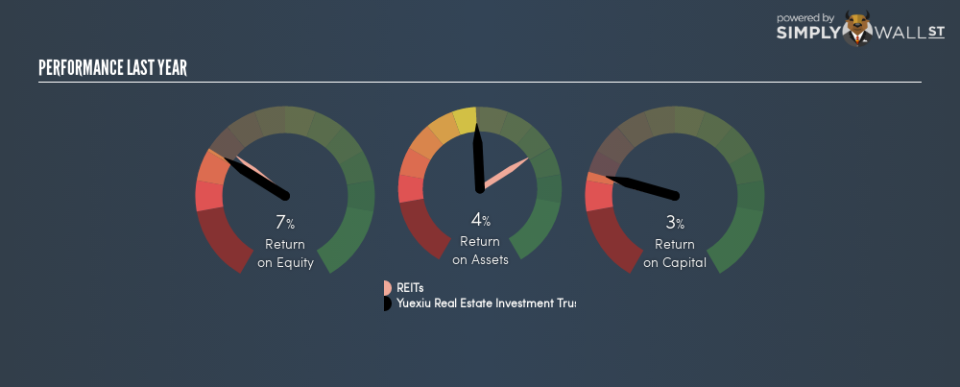Is Yuexiu Real Estate Investment Trust’s (HKG:405) 6.7% ROE Strong Compared To Its Industry?

Many investors are still learning about the various metrics that can be useful when analysing a stock. This article is for those who would like to learn about Return On Equity (ROE). To keep the lesson grounded in practicality, we’ll use ROE to better understand Yuexiu Real Estate Investment Trust (HKG:405).
Yuexiu Real Estate Investment Trust has a ROE of 6.7%, based on the last twelve months. That means that for every HK$1 worth of shareholders’ equity, it generated HK$0.067 in profit.
See our latest analysis for Yuexiu Real Estate Investment Trust
How Do I Calculate Return On Equity?
The formula for ROE is:
Return on Equity = Net Profit ÷ Shareholders’ Equity
Or for Yuexiu Real Estate Investment Trust:
6.7% = 1025.528 ÷ CN¥16b (Based on the trailing twelve months to June 2018.)
It’s easy to understand the ‘net profit’ part of that equation, but ‘shareholders’ equity’ requires further explanation. It is the capital paid in by shareholders, plus any retained earnings. Shareholders’ equity can be calculated by subtracting the total liabilities of the company from the total assets of the company.
What Does Return On Equity Signify?
ROE looks at the amount a company earns relative to the money it has kept within the business. The ‘return’ is the amount earned after tax over the last twelve months. That means that the higher the ROE, the more profitable the company is. So, all else being equal, a high ROE is better than a low one. Clearly, then, one can use ROE to compare different companies.
Does Yuexiu Real Estate Investment Trust Have A Good ROE?
By comparing a company’s ROE with its industry average, we can get a quick measure of how good it is. However, this method is only useful as a rough check, because companies do differ quite a bit within the same industry classification. The image below shows that Yuexiu Real Estate Investment Trust has an ROE that is roughly in line with the reits industry average (7.9%).
That isn’t amazing, but it is respectable. Generally it will take a while for decisions made by leadership to impact the ROE. So I like to check the tenure of the board and CEO, before reaching any conclusions.
The Importance Of Debt To Return On Equity
Most companies need money — from somewhere — to grow their profits. The cash for investment can come from prior year profits (retained earnings), issuing new shares, or borrowing. In the first and second cases, the ROE will reflect this use of cash for investment in the business. In the latter case, the debt used for growth will improve returns, but won’t affect the total equity. In this manner the use of debt will boost ROE, even though the core economics of the business stay the same.
Yuexiu Real Estate Investment Trust’s Debt And Its 6.7% ROE
Although Yuexiu Real Estate Investment Trust does use debt, its debt to equity ratio of 0.82 is still low. I’m not impressed with its ROE, but the debt levels are not too high, indicating the business has decent prospects. Judicious use of debt to improve returns can certainly be a good thing, although it does elevate risk slightly and reduce future optionality.
But It’s Just One Metric
Return on equity is one way we can compare the business quality of different companies. A company that can achieve a high return on equity without debt could be considered a high quality business. If two companies have around the same level of debt to equity, and one has a higher ROE, I’d generally prefer the one with higher ROE.
But ROE is just one piece of a bigger puzzle, since high quality businesses often trade on high multiples of earnings. Profit growth rates, versus the expectations reflected in the price of the stock, are a particularly important to consider. So you might want to take a peek at this data-rich interactive graph of forecasts for the company.
Of course, you might find a fantastic investment by looking elsewhere. So take a peek at this free list of interesting companies.
To help readers see past the short term volatility of the financial market, we aim to bring you a long-term focused research analysis purely driven by fundamental data. Note that our analysis does not factor in the latest price-sensitive company announcements.
The author is an independent contributor and at the time of publication had no position in the stocks mentioned. For errors that warrant correction please contact the editor at editorial-team@simplywallst.com.

